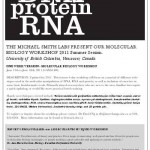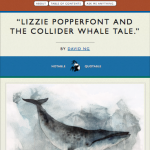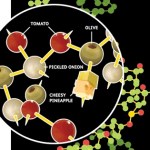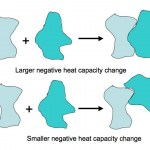
...but actually somewhere else...
So what's going on? The short version is that this is a goodbye post. The long version goes a little like this:
1. For a while now, I've been using twitter, primarily as a place to highlight interesting things. It has more or less replaced my blogging output. These tweets are often science-y, visual in nature, and with (of course) the occasional dose of Chewbacca. However, it soon became obvious to me that I should start blogging again so that such things could be compiled: more so because I'm a big fan of using these odd snippets to segue into…
The "Dance Your Ph.D." contest is on again for 2011. This unusual and highly interesting experiment in science outreach continues to be shepherded by John Bohannon, and continues to attract new sponsors -- this years sponsor is TEDx Brussels.
So what is this? Basically: you create an interpretive dance that "explains" your Ph.D. research and videotape it. Sounds easy, eh? No words, no powerpoint, just dancing. And you want the audience to walk away with a reasonable understanding of what you did or are currently doing your Ph.D. on. Send in a video and John will collect them all on his…
Even in the small theater where I saw Rise of the Planet of the Apes, it was clear that this is, to some degree, a father and son movie - there were several father and son pairs in the audience - more than I've seen in any other movie. "Yes, son, now you will see why our planet eventually will be taken over by apes." "Yes, dad, now you will see how CGI replaces this Roddy McDowell person you keep talking about."
Caution: spoilers.
Andy Serkis's Caesar and the rest of the ape-men were wonderful, as was slow build of the story. I also loved that the apes' goal was not world domination but to…
Reblogitation (pronounced with a "j" sound for the "g", of course): the blogospheric phenomenon of reposting, and re-reposting, and re-re-reposting the information from the "apparent first" or "most snarky" report (or blog post) about a news item.
Mother-post: the "apparent first" or "most snarky" report of an item, that then provides "the facts" for most of the other stories about that item online (even those that don't reference or link to the mother-post).
The flurry of recent news about the question "Should evolution be taught in public schools?" that was asked of the recent crop of MIss…
(You can follow Dave on twitter @dnghub)
30 MINUTES, 70 FATES.
You don't know it, but as I write this piece, there is some serious procrastination going on. My attention span is weak and sidetracked constantly by a variety of diversions, and if you must know, it's taken me close to half an hour to write these first two sentences. Still, one could argue that none of us are strangers to procrastination, and 30 minutes is relatively short - only a minor instance of time in the grand scheme of things.
But a lot can happen in thirty minutes. Earlier, I had been looking over some 2009 UNAIDS…
It's election time again and, as is the norm, we see teachers using the opportunity to talk to their students about things such as Prime Ministers, parliaments, senates, and, well, basically - how this thing we call the "Canadian Government" is meant to work. My own daughter who is in Grade 4 is in such a class, and has been asking me all sorts of questions: the most prevalent of which is "Who is Alice Wong?" Not a surprising question, since her face is fairly ubiquitous in Richmond, BC where I live, being set against the many blue Conservative signs and placards (she is our incumbent MP…
I just noticed that there's a workshop being offered from June 13th to June 18th, 2011, in Vancouver, Canada, that provides technical and hands-on training for "scientists and non-scientists interested in human cloning." This course has a price tag of $1400 (does not include transportation, room and board) and apparently provides the following:
"This professional course (which can accept only 12 clients) will guide participants through the various methodologies involved in the production of a human clone. This includes extensive lectures on the various techniques as well as a significant…
The chair of the Theatre Dept. here at LSU and I have begun co-producing a new "SciArt Conversation Series" here at LSU -- where we get scientists and artists on stage together at the same time for informal presentations of their work. We are trying to pick combinations that have some sort of real or semantic overlap. Our first one, which we just called "Silk", had an entomologist talking about the evolution of spiders and spider silk along with a choreographer and two dancers demonstrating and explaining dance moves on hanging silks.
This first one had a small but very vocal and…
(Reprinted from Boingboing)
Access to life-saving medicines is not a luxury, but a human right.
~Canadian HIV/AIDS Legal Network
To me, the above statement is one of those things that sound like a no-brainer. Put another way, if I were to ask you whether you thought a person's income should determine whether they live or die from something like HIV/AIDS, then I think you would see that the answer is nothing but obvious. But here I am, in Canada, writing this post, because there is a very real danger that members of my government think that this isn't such an easy decision after all - that…
A physicist friend of mine recently lent me a copy of Harry Frankfurt's "On Bullshit", which purports to be the only ever philosophical analysis of "bullshit". This former essay turned teeny tiny hardback book reaches such profound conclusions as: 1) bullshit is sort of like humbug, only more excremental; 2) bullshit is worse than lying, because liars know the truth, while bullshitters just yak away without regard for the truth or non-truth of what they are saying; and 3) that since a person cannot ever really know him/her self, any sincere expression of one's feelings is bullshit.
This…
Okay, after a long, long gap (on the blogosphere timescale) and/or almost zero elapsed time (by scientific literature standards), we're going to attempt to wrap up this mini-series on heat capacity effects in biology. Parts 1 and 2 are here and here, respectively.
So: How do you know if your reaction has a heat capacity change? Actually, it's easy: collect data as a function of temperature and make a van't Hoff plot (ln 1/Keq versus ln 1/temperture) or a Gibbs-Helmholtz plot (ÎG versus temperature) - if either plot is not-linear your reaction has a ÎCp.
This figure shows Gibbs-Helmholtz…
I've been strangely fascinated by the "arsenic-eating" and maybe "arsenic-utilizing' bacteria report from NASA researchers and the so-called "backlash" ("arsenic-gate") in the blogosphere. Many others have posted on this topic. What I've found most interesting is that there seem to be several parallel and barely intersecting universes: 1) the scientific literature, 2) the traditional media, and 3) the blogosphere.
Universe 1: Wolfe-Simon has published for several years about the potential for unique
arsenic metabolism (among other topics), and this is the next paper in her series of…
Although I can't remember where I saw "play with duct tape" on the list of learning objectives, I figured it would be cool to make a paper pinball machine with the kids - it's kind of "educational." (right?). Anyway, this ended up being a lot of fun, and (if I do say so myself) our pinball machine is FREAKING AWESOME!
Here are some pictures, and the video at the end is where Hannah and Ben demonstrate its awesomeness.
VIEW FROM FRONT
VIEW FROM TOP
And the video...
(Follow David at @dnghub)
Sorry it's been a bit quiet here lately. Things have been busy at the museum, and I've also been writing in other places. In particular, These days I'm a guest blogger at Boing Boing, and on top of that, I'm also having fun starting a children's novel.
This novel has a mouthful of a title, Lizzie Popperfont and the Collider Whale Tale, and it's been partly inspired by my time here at the Natural History Museum. More importantly, there's going to be an underlying and subtle narrative that asks, "What happens to society and culture when only self interested elites are aware of the…
Just a quick note for you Brits out there (and specifically Londoners I guess). Tonight (Sept 24th), the Natural History Museum is hosting a "Science Uncovered" evening, whereby scientists and staff from various departments will be on hand.
As well, there will be a place where cocktails can be purchased, which will probably make all the sciencegeek talk all the more lively than usual.
Plus, if you have some biodiversity or fossil flavoured artifact you want looking at, this is also a good time to pop by and show the item off to a panel of experts (they will be manning a sort of "Antique (…
The laws of thermodynamics are empirical laws - they were not derived from some first principles of the universe: they were derived by doing thousands and thousands of experiments, and then coming up with some relationships that could quantitatively explain all those experiments.
In biological thermodynamics, we are at the beginnings of trying to define a similar set of "laws of biothermodynamics" - in this case we want relationships that connect thermodynamic quantities (ÎG, ÎH, ÎS, ÎCp) to functional or structural information about the biomolecules themselves. Nobody has anything that…
Or something like that:...
I just noticed, with some amusement, that the 2010 Toy of the Year is something akin to a cute robotic rodent. Specifically, they are called Zhu Zhu Pets, a mechanical universe of furry and mobile hamsters, expandable with a hamster-like ecosystem complete with wheels, balls, and see through tunnels. The fact that this was announced during the International Year of Biodiversity seems deliciously ironic but maybe also informative?
Lest you think my thoughts on biodiversity outreach and education will settle uncomfortably on robotics, or perhaps even more frightening…
Scienceblogs is promoting the writing of "Science 101" general topic posts all through the "back to school" month of September. So, here is the first in a multi-part series on Heat Capacity in Biology:
Heat Capacity in Biology 101: What is it?
Heat capacity is basically a proportionality constant. For any substance, the heat capacity tells you how much the temperature of the substance will change when you add a specific amount of heat.
Here is an absolutely beautiful schematic illustration of the difference between a small heat capacity and a large heat capacity (from a website on the…
Image: Nagoya Congress Center plus Millenium Falcon reworked from original photo by Paula Pedrosa. link.
Originally made for a series of Nagoya COP10 primers at Boing Boing (1 | 2 | SB | 3 | 4)
I: SORTING OUT THE VERNACULAR
So what is up with this Nagoya thing? Well, it's a big international meeting that is happening in Nagoya's Congress Centre (see the picture above), starting on October 18th and lasting until the 29th. No doubt, you weren't necessarily lured into finding out more by the conference's bouncy theme song. You certainly weren't intrigued by the reams of official documents,…
Wow! Either it's an odd coincidence, or the Latisse marketers are highly vigilant monetizers, because in less than 24 hours after I posted yesterday's rambling little piece about the eyelash wonder drug, a tasteful little ad for it showed up on the Scienceblogs homepage (cue spooky music now). Robot voice: "Oh yes, I will go buy Latisse now." I will try it on my cats, because I have always thought that cats with long eyelashes are wickedly beautiful.
But, Latisse, your ad says "ask your doctor about Latisse" -- I'm a bit disappointed. How could you pass up such a ripe possibility for pun…





